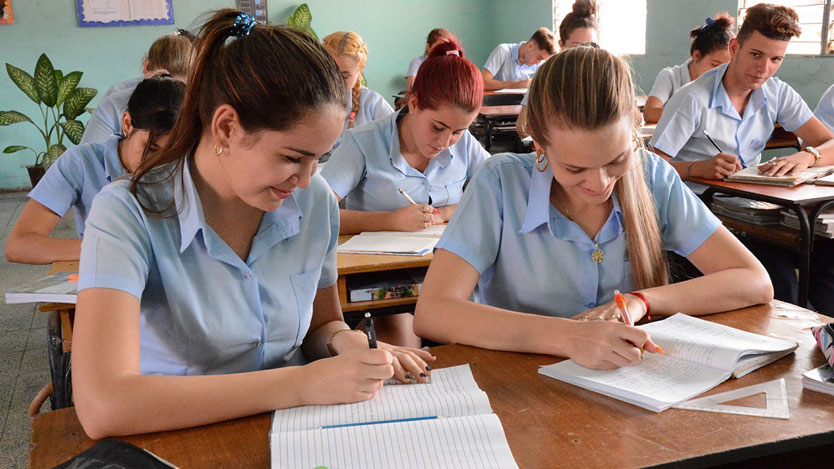
After the initial doubt, when she thought of studying Journalism, Natalie Castellanos Pérez decided that Medicine was her thing and, with that goal, she is now getting ready for the three entrance exams that separate her from the Faculty of Medical Sciences and from a professional future dedicated to saving lives and curing the most dissimilar diseases. Notebook in hand, she walks the corridors of her school, the Cándido González Morales Vocational Pre-University Institute of Exact Sciences, and divides her time between mathematical formulas, grammar exercises and passages from the History of Cuba.
“At school, we were divided into two different groups: one in which the most advantaged are found and another with those who present greater deficiencies and, therefore, need differentiated attention from the teachers. In addition to normal classes, we have review sessions, in the afternoon, on specific content of each subject that goes to entrance exams. Thus, one decides which reviews to attend according to their individual needs”.
“To get out of the alternate weekends, we must do three tests, one for each subject to be examined. If we pass, we go home. Otherwise, we stay the whole eleventh at the school. It is another way of encouraging study and not wasting time”.
Raciel Valdés Bravo, from the Ernesto Che Guevara Urban Pre-University Institute, in the main municipality, also looks with some concern at the increasingly close moment of the entrance exams. The boy aspires to train as a Telecommunications engineer, but to achieve his goal, he knows, he needs good results in these exams.
“I think that today nobody is 100 percent prepared for this. There is a lot to study and we know that the tests are rigorous, but, at least in my personal experience, I have had good teachers close by, who have helped us with the gaps that we brought from previous grades.
“One of my headaches is calligraphy, but that's where I'm at. Right now we try to take advantage of everything that contributes to guarantee the success. Thus, many of us also combine the preparation they give us at school with private tutoring classes, which also help a lot”.
Vivian González Rodríguez, head of the Department of Pre-University Education in the Provincial Directorate of Education, explained to INVASOR that this month they worked on an intensive preparation stage with twelfth grade students, which culminated on July 20.
Later, from August 1st to 15, summer courses will be held in all municipalities, specifically aimed at the subjects of Mathematics and History of Cuba, as these are the subjects with the worst results in the entrance exams.
“Summer courses are not compulsory: the student who wishes attends. Something very positive is that we will maintain contact between the teacher who teaches in the classroom and this summer teacher, which makes it possible to work on the contents in a linear way and provide feedback on what each student is missing”, explains the official.
“Starting on September 4, we will resume the intensive preparation stage, with teleclasses in the morning, which you can view from your homes, and review shifts in the evening, at the school. Differentiated attention will also be given to students with greater difficulties, both in the contents of these three subjects, and in spelling, since in other courses it has happened to us that the student passes the exam, but is disqualified for presenting more than 20 errors spelling.
“Since the restart of the school year, the worker-peasant faculties will also support our students, who will be able to join the preparations for university entrance, taught on Mondays, Wednesdays and Fridays as part of the education system for young people and adults. This will be one more option available to pre-university students.”
Undoubtedly, there are many measures that are taken to guarantee better results in the upcoming Higher Education entrance exams, scheduled for the coming month of October. Although this is not equivalent to a magical comeback in the results of the province.
Invasor has followed these numbers year after year, which could still improve a lot and which today give us a perspective of where "the shots are going". Five years ago, in 2018, 56.39 percent of the total number of students who took entrance exams in Ciego de Ávila passed in the first round. In 2019 this percentage rose to 62.2; increased in 2020 to 63.4 percent; and it increased slightly again in 2021 to 65.3. The previous course was the one with the worst results in the last five years, with only 49.5 percent passing.




